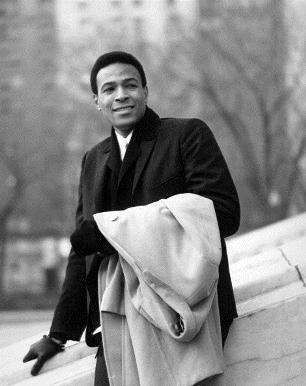
Marvin Gaye made a huge contribution to music in general and the Motown sound in particular. As one of Motown’s renaissance men, Gaye could do it all. He wrote, produced and played a variety of instruments. Most of all, Gaye possessed a classic R&B voice that was edged with grit yet tempered with sweetness.
In the early days of Motown, Gaye played drums and piano on tour and in the studio. He wrote or co-wrote songs for himself and others, including “Dancing in the Street,” a Sixties soul classic made famous by Martha and Vandellas.
He was born Marvin Pentz Gay (he would later add the “e” to his surname) on April 2, 1939, in Washington D.C. His father, Rev. Marvin Gay Sr., led a small, charismatic sect that combined elements of Orthodox Judaism and fundamentalist Christianity. His mother worked as a domestic and raised Marvin and his four siblings.
In 1958 Gaye’s first vocal group, the Marquees, were tapped by Harvey Fuqua to replace the departed members of his own, the Moonglows. Through Fuqua’s acquaintance with Berry Gordy, Gaye wound up at Motown. Both Gaye and Fuqua married sisters of Gordy’s (Anna and Gwen, respectively).
Although he initially envisioned himself a supper-club singer and dreamed of becoming “the black Frank Sinatra,” Gaye succeeded at Motown as a soul man who aimed his talent at a younger audience. Gaye’s first success under his name came in 1962 with “Stubborn Kind of Fellow.”
From that point on, Gaye placed 56 records on the pop singles charts, both as a solo act and with female duettists, including Wells, Kim Weston, Tammi Terrell and Diana Ross. He connected with uptempo dance tunes (“Hitch Hike,” “Can I Get a Witness,” “I’ll Be Doggone”) and more romantic fare that spotlighted his midrange tenor (“How Sweet It Is to Be Loved by You,” “Too Busy Thinking About My Baby”).
Gaye scored his greatest triumph with an edgy, sinuous version of “I Heard It Through the Grapevine,” produced and co-written by Motown staffer Norman Whitfield. Gaye’s version shot topped the charts for seven weeks, sold four million copies and became Motown’s biggest-selling single of the Sixties. For all this, Gaye earned the nickname “the Prince of Motown.”
See more at: http://rockhall.com/inductees/marvin-gaye/bio/#sthash.6kdgJQAZ.dpuf

